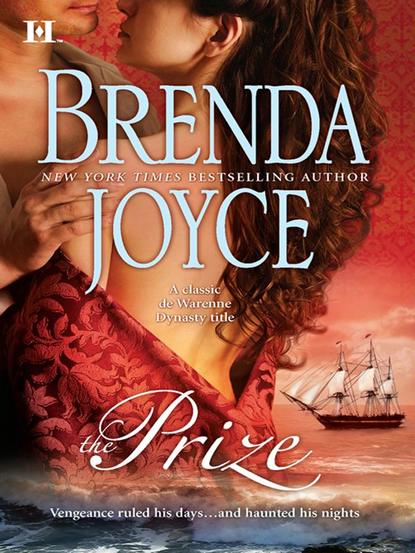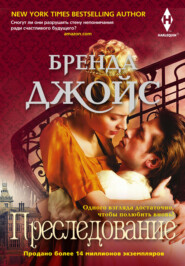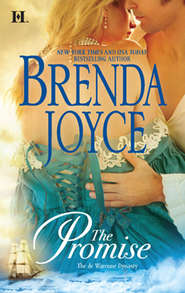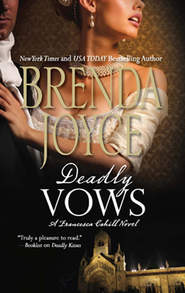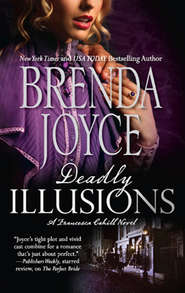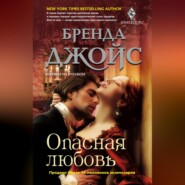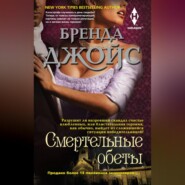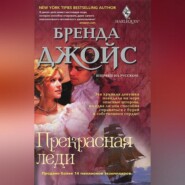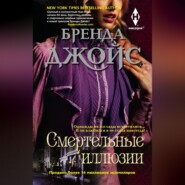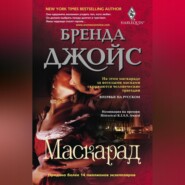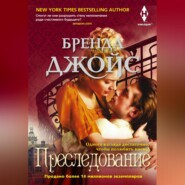По всем вопросам обращайтесь на: info@litportal.ru
(©) 2003-2025.
✖
The Prize
Автор
Год написания книги
2019
Настройки чтения
Размер шрифта
Высота строк
Поля
She stared up at him, her eyes filling with tears.
“I’m not hurt,” he added thickly, and he kissed her briefly on the lips. “Now go downstairs and do not come out until I say so.”
Mary nodded and went down. Devlin rushed forward as a cannon boomed, terribly close to the manor. “Father! Let me come with you—I can help. I can shoot—”
Gerald whirled, striking Devlin across the head, and he flew across the stone floor, landing on his rump. “Do as I say,” he roared, and as he ran back through the hall, he added, “And take care of your mother, Devlin.”
The front door slammed.
Devlin blinked back tears of despair and humiliation and found himself looking at Sean. There was a question in his younger brother’s pale gray eyes, which remained wide with fear. Devlin got to his feet, shaking like a puny child. There was no question of what he had to do. He had never disobeyed his father before but he wasn’t going to let his father face the redcoats he’d seen earlier alone.
If Father was going to die, then he’d die with him.
Fear made him feel faint. He faced his little brother, breathing hard, willing himself to be a man. “Go down with Mother and Meg. Go now,” he ordered quietly. Without waiting to see if he was being obeyed, Devlin rushed through the hall and into his father’s library.
“You’re going to fight, aren’t you?” Sean cried, following him.
Devlin didn’t answer. A purpose filled him now. He ran to the gun rack behind his father’s massive desk and froze in dismay. It was empty. He stared in disbelief.
And then he heard the soldiers.
He heard men shouting and horses whinnying. He heard swords ringing. The cannon boomed again, somewhere close by. Shots from pistols punctuated the musket fire. He slowly turned to Sean and their gazes locked. Sean’s face was pinched with fear—the same fear that was making Devlin’s heart race so quickly that he could barely breathe.
Sean wet his lips. “They’re close, Dev.”
He could barely make his mouth form the words, “Go to the cellar.” He had to help his father. He couldn’t let Father die alone.
“I’m not leaving you alone.”
“You need to take care of Mother and Meg,” Devlin said, racing to the bench beneath the gun rack. He tore the pillows from the seat and hefted the lid open. He was disbelieving—Father always kept a spare pistol there, but there was nothing but a dagger. A single, stupid, useless prick of a dagger.
“I’m coming with you,” Sean said, his voice broken with tears.
Devlin took the dagger, then reached into the drawer of his father’s desk and took a sharp letter opener as well. He handed it to Sean. His brother smiled grimly at him—Devlin couldn’t smile back.
And then he saw the rusty antique display of a knight in his armor in the corner of the room. It was said that an infamous ancestor, once favored by an English queen, had worn it. Devlin ran to the statue, Sean on his heels as if attached by a short string. There, he shimmied the sword free from the knight’s gauntlet, knocking over the tarnished armor.
Devlin’s spirits lifted. The sword was old and rusted, but it was a weapon, by God. He withdrew it from the hilt, touched the blade and gasped as blood spurted from his fingertip. Then he looked at Sean.
The brothers shared a grin.
The cannon boomed and this time the house shook, glass shattering in the hall outside. The boys blinked at each other, wide-eyed, their fear renewed.
Devlin wet his lips. “Sean. You have to stay with Mother and Meg.”
“No.”
He felt like whacking his brother on the head the way Gerald had struck him. But he was also secretly relieved not to have to face the red hordes alone. “Then let’s go,” Devlin said.
THE BATTLE WAS RAGING just behind the cornfields that swept up to the ruined outer walls of Askeaton Castle. The boys raced through the tall plants, hidden by the stalks, until they had reached the last row of corn. Crouching, Devlin felt ill as he finally viewed the bloody panorama.
There seemed to be hundreds—no, thousands—of soldiers in red, by far outnumbering the ragged hordes of Irishmen. The British soldiers were heavily armed with muskets and swords. Most of the Irishmen had pikes. Devlin watched his countrymen being massacred, not one by one, but in waves, five by five, six by six, and more. His stomach churned violently. He was only ten but he knew a slaughter when he saw one.
“Father,” Sean whispered.
Devlin jerked and followed his brother’s gaze. Instantly, he saw a madman on a gray horse, swinging his sword wildly, miraculously slaying first one redcoat and then another. “Come on!” Devlin leapt up, sword raised, and rushed toward the battle.
A British soldier was aiming his musket at a farmer with a pike and dagger. Other soldiers and peasants were intently battling one another. There was so much blood, so much death, the stench of it everywhere. Devlin heaved his sword at the soldier. To his surprise, the blade cleaved through the man completely.
Devlin froze, shocked, as the farmer quickly finished the soldier off. “Thanks, boyo,” he said, dropping the dead soldier in the dirt.
A musket fired and the farmer’s eyes popped in surprise, blood blossoming on his chest.
“Dev!” Sean shouted in warning.
Devlin turned wildly to face the barrel of a musket, aimed right at him. Instantly he lifted his sword in response. He wondered if he was about to die, as his blade was no match for the gun. Then Sean, the musket in his hands clearly taken from the dead, whacked the soldier from behind, right in the knees. The soldier lost his balance as he fired, missing Devlin by a long shot. Sean hit him over the head, and the man lay still, apparently unconscious.
Devlin straightened, breathing hard, an image of the soldier boy he’d just helped kill in his mind. Sean looked wildly at him.
“We need to go to Father,” Devlin decided.
Sean nodded, perilously close to tears.
Devlin turned, searching the mass of struggling humanity, trying to spot his father on the gray horse. It was impossible now.
And suddenly he realized that the violent struggling was slowing.
He stilled, glancing around wide-eyed, and now he saw hundreds of men in beige and brown tunics, lying still and lifeless across the battlefield. Interspersed among them were dozens of British soldiers, also lifeless, and a few horses. Here and there, someone moaned or cried out weakly for help.
An Englishman was shouting out a command to his company.
Devlin’s gaze swept the entire scene again. The battlefield had spread to the banks of the river on one side, the cornfield behind and the manor house in the south. And now the British soldiers were falling into line.
“Quick,” Devlin said, and he and Sean darted over dead corpses, racing hard and fast for an edge of the cornfield and the invisibility it would give them. Sean tripped on a bloody body. Devlin lifted him to his feet and dragged him behind the first stalk of corn. Panting, they both sank to a crouch. And now, from the slight rise where the cornfield was, he could see that the battle was truly over.
There were so many dead.
Sean huddled close.
Devlin knew his brother was close to crying. He put his arm around him but did not take his gaze from the battlefield. The manor was to his right, perhaps a pasture away, and there were dead littering the courtyard. His gaze shot back to the left. Ahead, not far from where they hid, he saw his father’s gray stallion.
Devlin stiffened. The horse was being held by a soldier. His father was not mounted on it.
And suddenly, several mounted British officers appeared, moving toward the gray steed. And Gerald O’Neill, his hands bound, was being shoved forward on foot.
“Father,” Sean breathed.
Devlin was afraid to hope.





